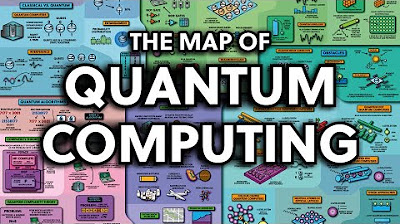Why Quantum Algorithms? — Programming on Quantum Computers — Coding with Qiskit S2E1
Summary
TLDRIn this episode of Coding with Qiskit, host Jin-Sung Kim introduces the exciting world of quantum computing. He highlights key algorithms, including the Variational Quantum Eigensolver (VQE), which simulates molecule ground state energy, and the quantum support vector machine for data classification. Jin also demonstrates how quantum computing can vastly outperform classical methods, such as finding an item in a large dataset. As quantum computing evolves, Jin encourages viewers to explore its real-world applications and promises an engaging journey into building quantum algorithms in upcoming episodes.
Takeaways
- 😀 Jin-Sung Kim is the host for the 'Coding with Qiskit' season and will guide viewers through quantum computing concepts.
- 😀 The focus this season is on teaching algorithms and applications in Qiskit, building on last season's foundation in quantum computing fundamentals.
- 😀 Jin is based in the San Francisco Bay Area and works on optimizing performance in current quantum computers.
- 😀 He holds a PhD in electrical engineering and materials science from Princeton and has a background in working with Abe, his lab mate.
- 😀 One of the algorithms featured this season is the Variational Quantum Eigensolver (VQE), which simulates the ground state energy of molecules in quantum chemistry.
- 😀 VQE is more efficient than classical methods, which face exponential computational costs as the number of particles in a system grows.
- 😀 Another key algorithm to explore is the Quantum Support Vector Machine (QSVM), used for classifying data based on features, offering advantages over classical algorithms.
- 😀 Quantum computing can drastically reduce the number of tries needed to search large data sets, offering a significant speed-up over classical methods.
- 😀 A classical search through a list of 1,000 items may require 1,000 tries, but a quantum search can reduce this to just 31 tries, even in the worst-case scenario.
- 😀 The field of quantum computing is still in its early stages, but it offers exciting opportunities to study real-world applications from anywhere in the world.
- 😀 In the following weeks, Jin will guide viewers in building their first quantum algorithm, encouraging them to engage with the content and stay tuned.
Q & A
Who is the host of 'Coding with Qiskit' in this season?
-The host of 'Coding with Qiskit' in this season is Jin-Sung Kim, or Jin for short.
What was covered in the previous season of 'Coding with Qiskit'?
-In the previous season, Abe introduced the fundamentals of programming a quantum computer using Qiskit.
What is the focus of this season's content on 'Coding with Qiskit'?
-This season focuses on diving deeper into quantum algorithms and applications, including topics like VQE and quantum machine learning.
What is the Variational Quantum Eigensolver (VQE)?
-The Variational Quantum Eigensolver (VQE) is an algorithm that allows us to efficiently simulate the ground state energy of a molecule, which is crucial in the field of quantum chemistry.
Why is simulating ground state energy difficult using classical computers?
-Simulating the ground state energy of a molecule is difficult with classical computers because the computational cost grows exponentially as more particles are added to the system.
How does quantum computing improve upon classical computing for simulating ground state energy?
-Quantum computing can simulate the ground state energy of a molecule much more efficiently, avoiding the exponential growth in computational cost that classical computers face.
What is the Quantum Support Vector Machine (QSVM)?
-The Quantum Support Vector Machine (QSVM) is a quantum algorithm used for classifying data sets based on their features, and it may offer advantages over its classical counterpart.
How does quantum computing help in searching through large data sets?
-Quantum computing can significantly reduce the number of attempts required to search through large data sets. For example, it can find a number in a list of 1,000 elements in only 31 tries, compared to the 1,000 tries required by classical computing.
Why is now a good time to get involved in quantum computing?
-Now is a great time to get involved in quantum computing because, for the first time, people can study real-world applications from the comfort of their homes or any location in the world.
What can viewers expect in the next episode of 'Coding with Qiskit'?
-In the next episode, viewers will learn how to build their very first quantum algorithm.
Outlines

This section is available to paid users only. Please upgrade to access this part.
Upgrade NowMindmap

This section is available to paid users only. Please upgrade to access this part.
Upgrade NowKeywords

This section is available to paid users only. Please upgrade to access this part.
Upgrade NowHighlights

This section is available to paid users only. Please upgrade to access this part.
Upgrade NowTranscripts

This section is available to paid users only. Please upgrade to access this part.
Upgrade NowBrowse More Related Video

How to program a quantum computer using Qiskit

Quantum Machine Learning Explained

The Map of Quantum Computing - Quantum Computing Explained

Computação Quântica - Fundamentos e Aplicações - Aula 06

mod03lec16 - Quantum Algorithms: Bernstein Vazirani Algorithm

Your Guide to 100+ Qubits: Quantum Computing in Practice
5.0 / 5 (0 votes)